
American families who pursue an international adoption often embrace their child’s culture of origin while raising them. It’s an approach, according to a University of Connecticut researcher, that may also be beneficial to the development of disabled children.
Disability is not just about having a medical condition – it comes with a culture and a community, says Laura K. Mauldin, assistant professor of human development and family studies and women’s, gender, and sexuality studies.
“It’s a service to the disability community to put that into the conversation, as we do with other cultural differences,” says Mauldin, who has worked extensively in the deaf community. “There’s nothing wrong with having a disability – what’s wrong is social attitudes about disabilities.”
Mauldin is leading a discussion about redefining how people with disabilities are viewed and treated in society today as part of the 109th Annual Meeting of the American Sociological Association in San Francisco.
Her presentation, “Culture Keeping and Raising a Child with a Disability,” extends the concept of “culture keeping” that sociologist Heather Jacobsen uses to describe international adoption to families of the disabled.
According to the U.S. Census Bureau, in 2010 (the most recent statistics available) about 57 million people had a disability. Notably, about 30 percent of families have at least one disabled member.
“In the United States, the disabled are the largest of all minority groups, because they are across all racial groups, all classes,” Mauldin says. “Disability does not discriminate.”
Addressing broad social attitudes about disabilities, which equate disabilities with an illness and, by extension, something that should be treated, is important to the development of disabled children, Mauldin says.
Mauldin notes that the disability community is already working on this attitudinal change by producing its own culture, addressing disability issues through plays, books, paintings, films, and activism.



